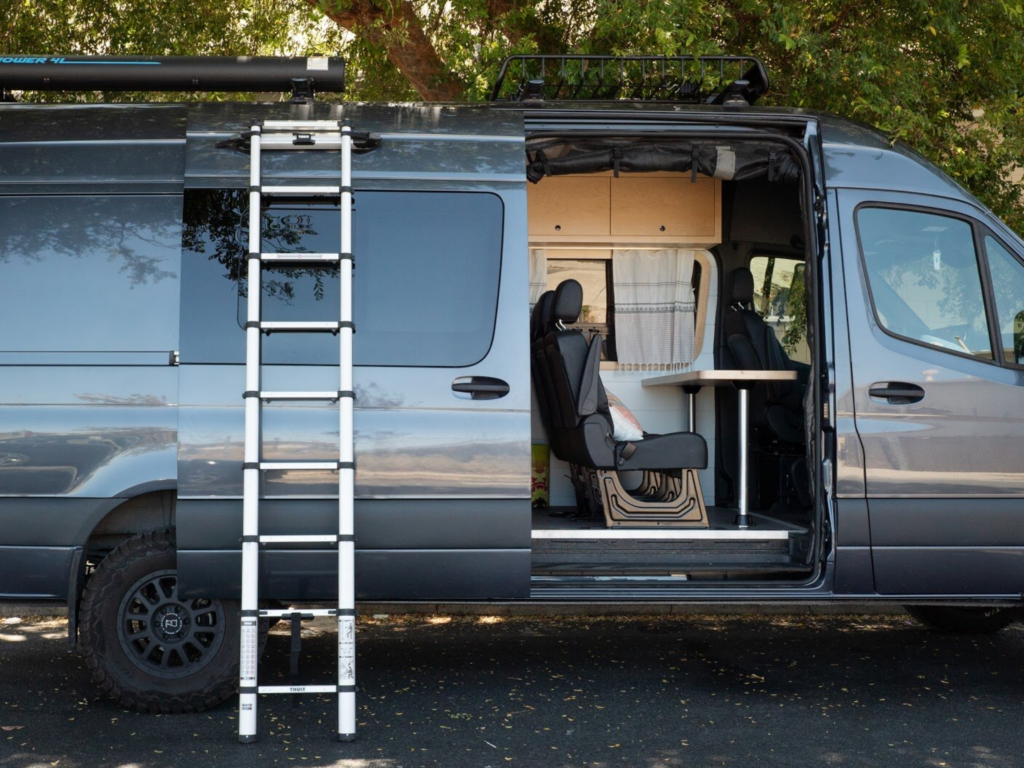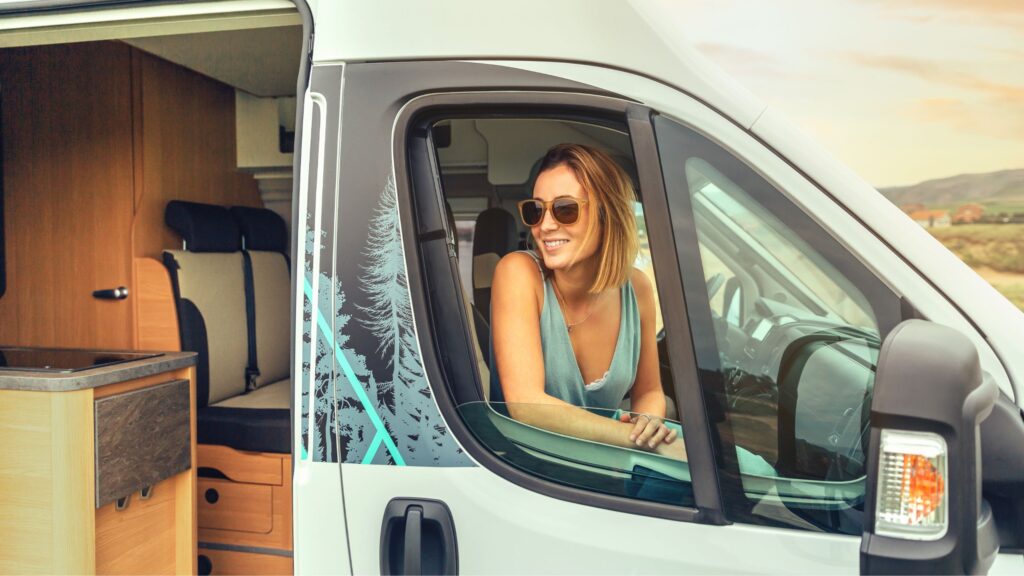Whether you live in your van full-time or just use it as a weekend getaway vehicle, your battery is crucial. Even if you have regular access to shore power, a solid power system is important in case you get stranded or end up having to boondock.
If you’ve never built out an electrical system or closely inspected your van’s batteries before, doing so can feel scary and overwhelming. There’s a lot that can go wrong. How do you know the best battery for van life and what battery management system to choose?
In this article, we’ll take a high-level look at the two main types of batteries popular with van lifers, break down their pros and cons, and talk about why you might choose one over the other. Then, we’ll look at some specific battery brands within those two categories so you can decide which is the best battery for your specific setup.
Table of Contents
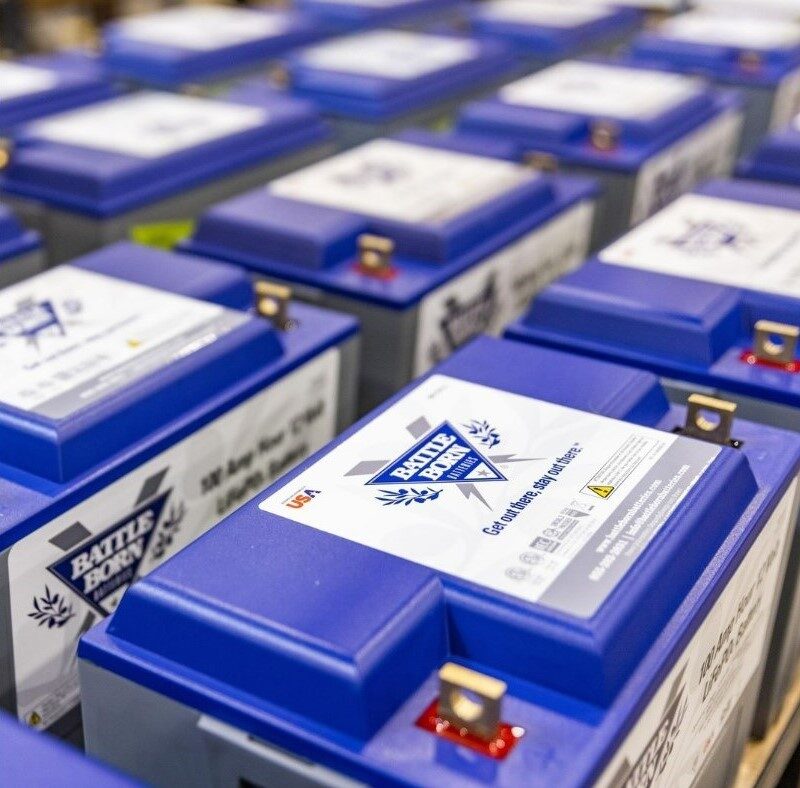
Types of Batteries for Van Life
These days, there are three main types of batteries available for vans: lithium batteries, AGM batteries, and traditional batteries.
“Hold up,” we hear you saying, “I thought you said there were only two types?”
Well, you’re correct. Technically there are three types of batteries, but these days, lead acid batteries are so inefficient compared to AGM and lithium-ion that most people are opting not to use them. We don’t recommend installing them if you are building out a brand new van. They are, however, cheap and available, so we’ll touch on them briefly in this article, mainly to illustrate why you would be better off choosing a different option.
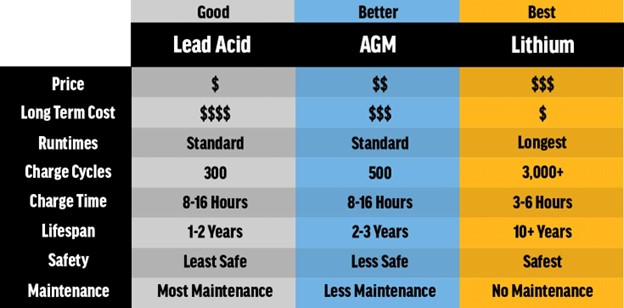
Traditional Lead Acid Batteries
Lead acid batteries are the oldest form of energy storage, and still the cheapest type of battery you can buy. However, because the overall lifespan of a lead acid battery is so short, the long-term cost of installing them in your van can end up being higher than AGM or lithium ion. This means they may not be the best battery for van life, but are a viable option if you’re on a budget and not planning to be in your campervan long-term.
A lead acid battery has the shortest life span and requires regular maintenance (they need to be regularly topped up with water in order to keep their electrolyte solution at the right density.) They can cause serious injury if not handled properly, and the gases they release while charging can cause explosions.
AGM Batteries
AGM stands for Absorbed Glass Mat or Absorbent Glass Mat. An AGM battery is a spill-proof, sealed lead acid battery with a thin fiberglass mat placed between the two lead plates. The glass mat keeps the battery’s electrolyte solution in place, so the battery doesn’t need to be regularly topped up with water.
AGM batteries require less maintenance than lead acid batteries and have a slightly longer lifespan of around 3 years (although we’ve seen AGMs last up to 6 years if cared for correctly.) One downside of AGM is that AGM batteries can’t be drained down to less than 50% of their usable energy capacity or left uncharged due to sulfation.
Lithium Ion Batteries
Lithium batteries are relatively new in the consumer space. Until recently, they were too prohibitively expensive upfront for most van lifers to consider. However, as lithium battery technology has advanced, they’ve become more available, and the cost has come down. They are now a viable option for most people building out a van electrical system.
A lithium battery contains no acid – instead, it uses lithium iron phosphate as the cathode material. Lithium iron phosphate batteries are safer than lead acid or AGM batteries, maintenance-free, and have a life span of up to 10 years. While they cost more upfront, we think they are a no-brainer for anyone looking for a safe, reliable van battery.
Best Batteries for Van Life
Let’s take a look at some of the most popular AGM batteries and lithium batteries available today. We’ve chosen our top three picks for each type of battery and compared them across features, price range, size/weight, and ease of installation.
Best AGM Batteries
While we highly recommend choosing lithium batteries over AGM for your camper van, we understand that the upfront cost of lithium-ion may still be too high for some van lifers to consider. So here are some options for solid AGM battery options on the market today.
Fullriver DC335-6
This battery has a capacity of 335Ah (amp hours) and a usable capacity of about 150Ah. It has a reserve capacity of about 750 minutes at 25Ah. It’s a six-volt battery, so you’ll need to buy two at least to power your 12v system. The upfront cost is around $600 per battery.
Pros
- Affordable (total cost around $1200)
- 2-year warranty
Cons
- Heavy (200+ lbs for total install)
- 3-5 year lifespan
Renogy Deep Cycle AGM
The Renogy 100 has excellent discharge performance compared to other AGMs. It can be discharged up to 60% of its total capacity and has a self-discharge rate of only 3% per month at room temperature. The price range is very affordable for any van life hopeful.
Pros
- Cheap (less than $300 per battery)
- 10% better discharge rate than other batteries of the same type
Cons
- Slow recharge time
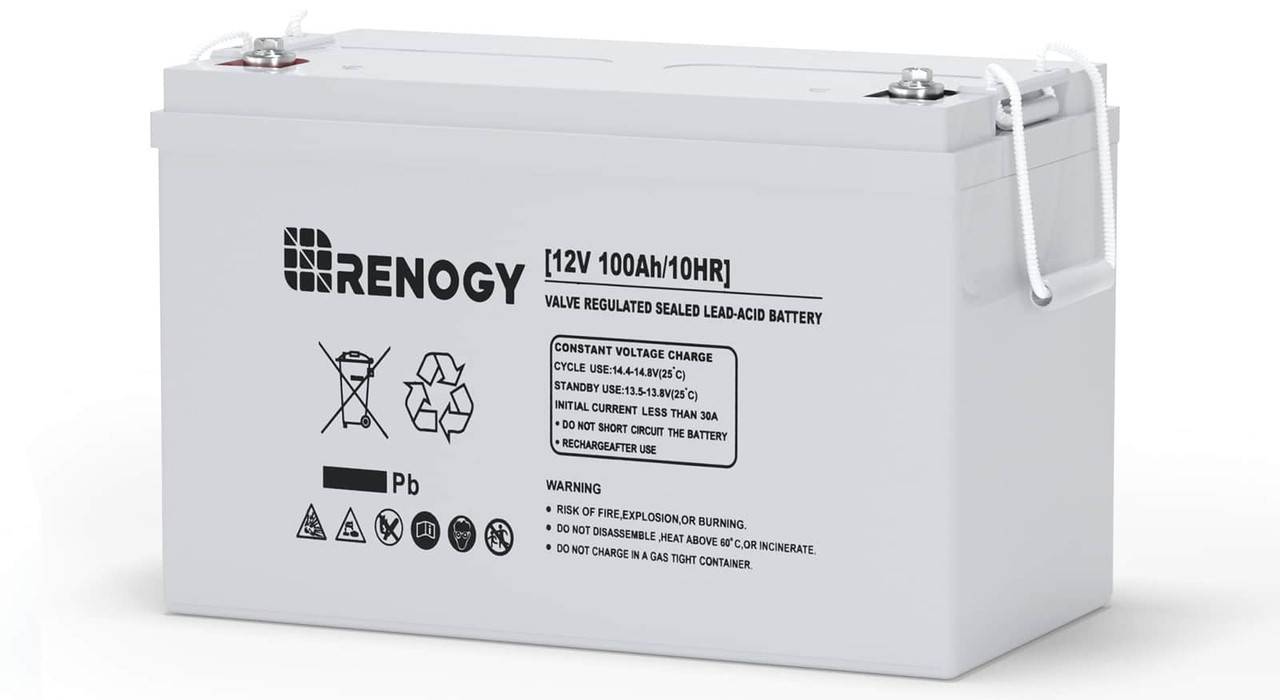
Lithium Ion Batteries
Lithium batteries are our top recommendation for those seeking a cost-effective, long-term solution for their van battery setup. While the initial cost is high, the money you will save over the life of the batteries is substantial, and other benefits like weight, capacity, and ease of maintenance also make them an attractive option and what we consider to be the best battery for van life.
Battle Born LiFePO4 with Built-in BMS
Battle Born batteries are considered by many to be the gold standard of lithium-ion batteries. The LifePO4 has a built-in BMS (Battery Management System) and provides the electricity of two AGM batteries. It’s a lightweight battery with up to 10 years of battery life and can be drained down to 0% capacity without damaging the battery.
Pros
- Gold standard of lithium iron phosphate batteries
- Battery weighs only 31 lbs
- Battery power equivalent to two AGMs
Cons
- Doesn’t handle freezing temperatures well
- More costly up front than AGM (around $800 per battery)
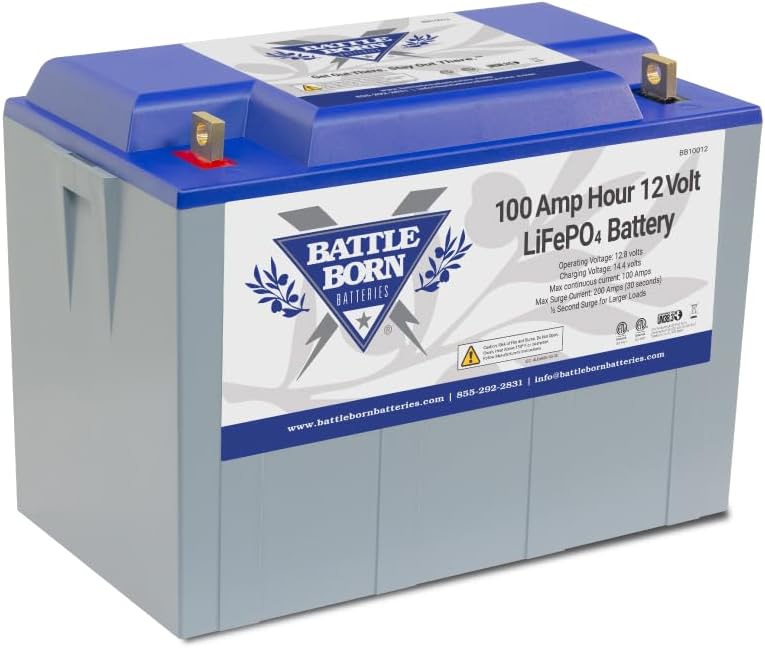
Renogy LiFePO4
The Renogy LiFePO4 is another great lithium battery option for your camper van as it is specifically designed to work with solar panels and is super lightweight and compact. It comes with an extended warranty to cover more than the total battery life, and, like Battle Born batteries, has a built-in management system.
Pros
- About half the price of Battle Born
- Lightweight and compact (26 lbs)
Cons
- Customer service was reported to be slow
- Extended warranty might indicate a known long-term issue with the battery life
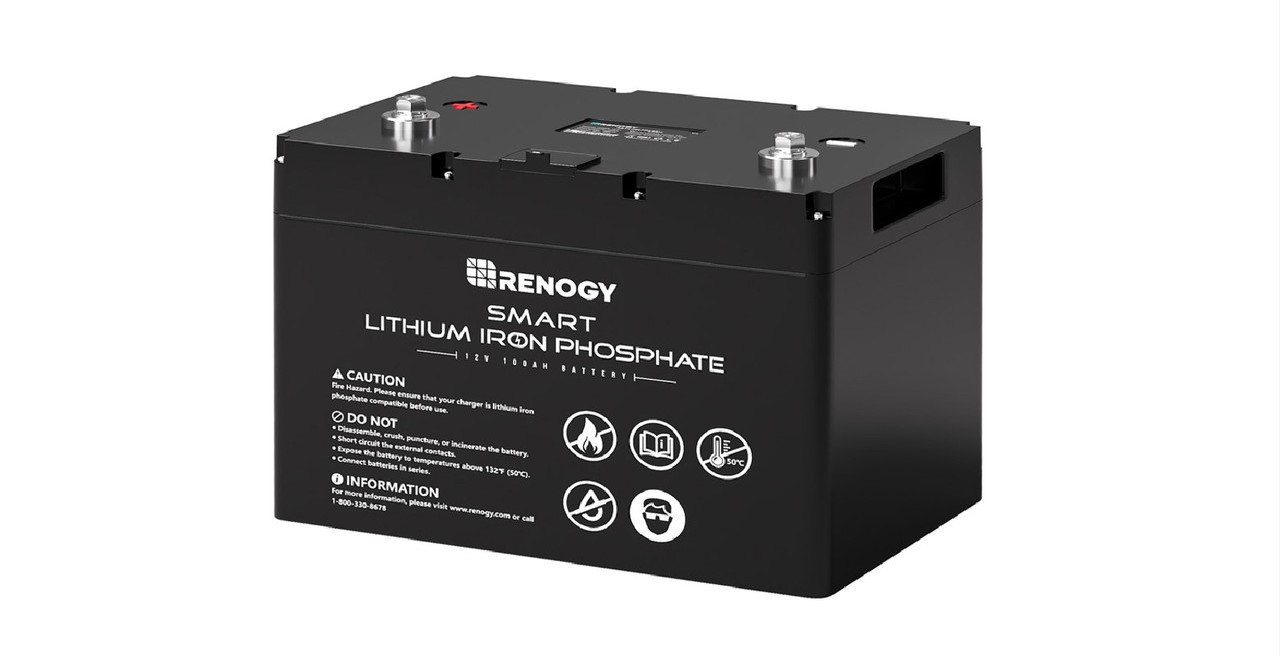
Victron Energy Smart Lithium Iron Phosphate Battery
Victron Energy is a trusted name when it comes to batteries and solar power. Their lithium batteries come in sizes ranging between 100Ah and 330Ah. This battery is Bluetooth enabled: it connects to an app on your phone so you can easily monitor the charge level.
Pros
- Very small and lightweight (330Ah battery measures just 10.5 x 14)
- Trusted name
- Smart battery – bluetooth-enabled for easy monitoring
Cons
- External BMS required
- Most expensive option (200Ah option is $1700)
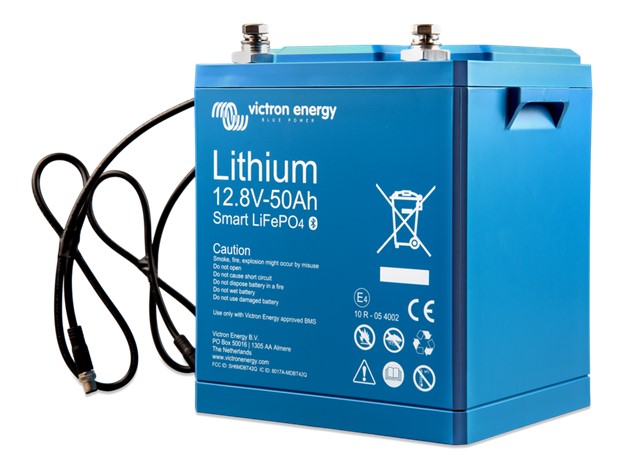
Choosing the Best Battery for Your Camper Van
Ultimately, the right battery for you will depend on a number of factors. The upfront cost isn’t the only thing to consider: you should also consider life span, maintenance, ease of use, and safety.
How long do you plan to live in or use the van? If you don’t plan to hold on to the van for a while, the initial investment in a lithium-ion battery setup may not be worth it. Where will you primarily be taking it? If you plan to spend a lot of time in sub-freezing temperatures, lithium batteries may not be the best batteries for you.
You should also carefully examine the space you have available for your battery bank and solar panels, as well as your power draw. How much power output do you really need? How much off-grid living will you be doing?
Last Word
Personally, we believe that after examining all these factors, a lithium-ion battery setup is still the best option for most people. Lithium iron phosphate battery technology is always advancing, and the more lithium batteries become available, the faster AGMs and lead acid batteries will become obsolete.
If you’re looking for a long-term, future-proof power system that will power your camper van for the next ten years, you can’t go wrong with Battle Born or Victron Energy lithium batteries.
FAQs
How much power do you need for a camper van?
The answer to this question will depend on how much power you draw. Make a list of all your electrical appliances and devices, and read the label or manual to figure out how many amps each device draws. This will help you determine how many Amp hours of power you need. As a rule of thumb, you probably want no less than a 400 Amp-hour lead-acid battery system, or a 300 Amp-hour lithium system.
Are lithium batteries safe?
All batteries come with some risk. Lead acid gives off gases that can cause a battery to explode. AGMs can also explode if not ventilated properly. Lithium batteries are no less safe than any other batteries when used correctly. While there is a risk of overheating and fire, this will only occur in batteries made of low-quality materials, have design defects, or are improperly recharged.
How do I choose a battery for my camper van?
When choosing the best battery for van life, keep the following things in mind:
- Amp-Hour Rating
- Required Maintenance
- Expected Lifespan
- Cost Of The Battery
- Anticipated Usage
